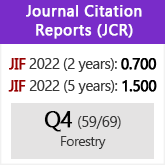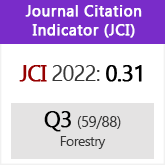A study of the Greek trade deficit in forest products. Current conditions and prospects
Abstract
The forest products trade deficit in Greece is a characteristic of the national forest sector over time. Greek imports of forest products are more than exports in order to cover domestic consumption. However, since its accession to the EU in 2001 Greece has not exploited all the advantages provided by the euro. The deficit in Greece has continued to increase because of growing imports, while average Europe countries have converted this to a surplus. Greece should aim to reduce this trend by decreasing imports, increasing exports or both. The present paper describes this deficit over time and proposes a forecasting model that could reduce the deficit using three possible scenarios. The model’s theoretical and practical contribution is that policymakers can use it as tool to calculate the future forest products deficit.
Downloads
References
Albanis, K, Anagnos N, Blioumis V, Stamou N, Christodoulou A. 1985. The Greek market of forest products and its evolution trends 1982–2010. Scientific Annals of the Department of Forestry and Natural Environment, Aristotle University of Thessaloniki. Vol KH, pp. 397-424. Thessaloniki.
Arabatzis G, Klonaris S. 2009. An analysis of Greek wood and wood product imports: Evidence from the linear quadratic aids. Forest Policy and Economics 11, 266- 270.
http://dx.doi.org/10.1016/j.forpol.2009.04.002
Cohen J, Cohen P. 1983. Applied Multiple Regression/ correlation. Analysis for the Behavioral Sciences. Second Edition. Lawrence Erlbaum Associates, Inc. New Jersey.
Draper N, Smith H. 1981. Applied regression Analysis. John Wiley and Sons, Inc, New York.
Efthymiou P. 2005. Sustainable Forest management in Europe -Integration Problems of new EU-Members-In: The international Conference on "Personnel and Scientific Provision for the Sustainable Forest Management: Conditions and Prospects. Mari-El Rep., Russian Federation 19-23/9/2005.
Food and Agriculture Organization of the United Nations (FAO). 1999. State of the European Forests and Forestry. Food and agriculture organization of the United Nations.U.N. publication, New York and Geneva.
Food and Agriculture Organization of the United Nations (FAO). 2006. Global forest resources Assessment 2005. Progress towards sustainable forest management. p. 88-89. Rome.
Food and Agriculture Organization of the United Nations (FAO). 2009. State of the world forests. Rome.
Food and Agriculture Organization of the United Nations (FAO): FAOSTAT-Forestry Available in http://faostat.fao.org/site/626/default.aspx#ancor. [07.07.2010].
Fousekis P, Pantzios C, Vakrou A. 2001. Wood trade flows: an empirical analysis of Greek wood imports. Journal of Forest Economics 7 (3), 225-243.
Koulelis P. 2006. Perspectives and trends of wood products market related with the dynamic progress of the European Union. Ph.D. Department of Forestry and Natural Environment, A.U.Th. Thessaloniki.
Koulelis P, Lefakis P. 2008. Econometric research of the supply, demand and trade for wood and wood products Chamber of Greece edition. Vol 19, Issue II No 4/2008, p. 4-15.
Koulelis P. 2009. Cluster analysis in primary roundwood production of 25 countries of European Union. Annals of Forest Research. issue no. 52, 163-168.
OECD Economic Outlook No. 87 May 2010.
Wiersum F, Elands B, Hoogtra M. 2005. Small Scale forest ownership across Europe: Characteristics and future potential. Small-scale Forestry 4(1), 1-19. W World Bank. World Development Indicators & Global Development Finance http://databank.worldbank.org/ddp/ home.do?Step=2&id=4&hActiveDimensionId=WDI_Ctry [07.07.2010].
© CSIC. Manuscripts published in both the printed and online versions of this Journal are the property of Consejo Superior de Investigaciones Científicas, and quoting this source is a requirement for any partial or full reproduction.
All contents of this electronic edition, except where otherwise noted, are distributed under a “Creative Commons Attribution 4.0 International” (CC BY 4.0) License. You may read here the basic information and the legal text of the license. The indication of the CC BY 4.0 License must be expressly stated in this way when necessary.
Self-archiving in repositories, personal webpages or similar, of any version other than the published by the Editor, is not allowed.















